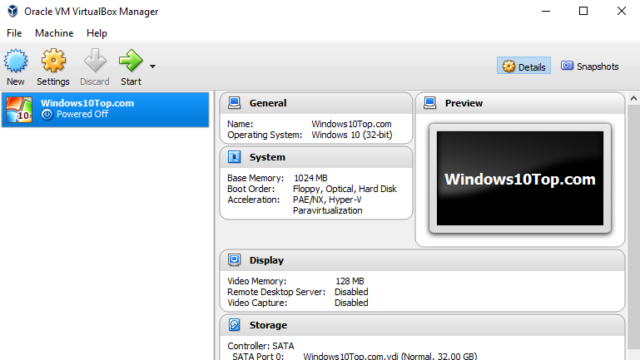Oracle Vm Virtualbox 32 Bit Windows 10
I am running VirtualBox v5.2.32 on an Ubuntu 18.04 host. I have created a Windows 10 (64-bit) guest. I installed VirtualBox v6.0.10 in the Windows 10 guest (Windows 10 Pro – v1903 – 64-bit). I am trying to create an Ubuntu (64-bit) guest inside the Windows 10 guest. I only see 32-bit options inside the Windows guest. After several attempts to resolve this, I am still only seeing 32-bit options.
Running a virtual machine is easy. Free apps like Oracle’s VirtualBox and commercial apps like VM ware make it fairly simple to get a VM running. The only tricky part is getting a VM image for the virtual machine. If you need to get a Windows 10 VM image, you have one of two options. Note: This may be obvious for most of you, but your host operating system should be 64-bit to run 64-bit guest operating systems in VirtualBox. If VirtualBox has no 64-bit option on Windows 10, then you can try the solutions on this page to fix the problem. Methods: Make sure that “Intel Virtualization Technology” and “VT-d” are enabled. Oracle VM VirtualBox Base Packages - 6.1.26. Freely available for Windows, Mac OS X, Linux and Solaris x86 platforms under GPLv2: Platform. Windows Installer. Solaris 10 5/08 and later or Solaris 11. Portable-VirtualBox is a free and open source software tool that lets you run any operating system from a usb stick without separate installation. Installation instructions Download and run Portable-VirtualBoxv5.1.22-Starterv6.4.10-Winall.exe. Choose a folder to extract to. Go to the folder and run Portable-VirtualBox.exe.

The purpose for creating a VM inside a VM is to be able to ensure that VirtualBox is working so that I can test Vagrant configuration inside a Windows 10 environment. Our Vagrant config is using 64-bit base images, so I need to be able set up 64-bit guests inside this Windows 10 guest.

…on the Ubuntu Host
I have checked Enable VT-x/AMD-V on the System > Acceleration tab in the Ubuntu host's VirtualBox config for the Windows 10 guest machine.
…on the Windows Guest
In the Windows guest machine, I can see that the host's physical CPU details are passed through in Settings > System > About and it shows as a '64-bit operating system, x64-based processor'.
This is a vanilla Windows 10 Pro installation, no additional software (i.e., no addon virus protection software).
I inspected Windows Features to ensure that the following are not checked:
- Guarded Host
- Hyper V
- Virtual Machine Platform
- windows Hypervisor Platform
- Windows Subsystem for Linux
…because my googleing seems to indicate that some or all of these might be an issue.
Based on a VirtualBox forum (I have a 64bit host, but can't install 64bit guests), using gpedit.msc, I set Local Computer Policy > Computer Configuration > Administrative Templates > System > Device Guard > Turn on Virtualization Based Security to Disabled. I also check that Windows Security > Device Security > Core Isolation Details is set to Off.
I have 'repaired' the VirtualBox installation. I have uninstalled VirtualBox, rebooted, reinstalled, and then rebooted again.
Oracle Vm Virtualbox 32 Bit Windows 10 free. download full Version
I looked at these related, previously asked questions and followed their suggestions as indicated in the steps above. Everything I am finding seems to be related to a Windows 64-bit host running directly on the host machine, not dealing with a Windows host which is itself a guest VM.